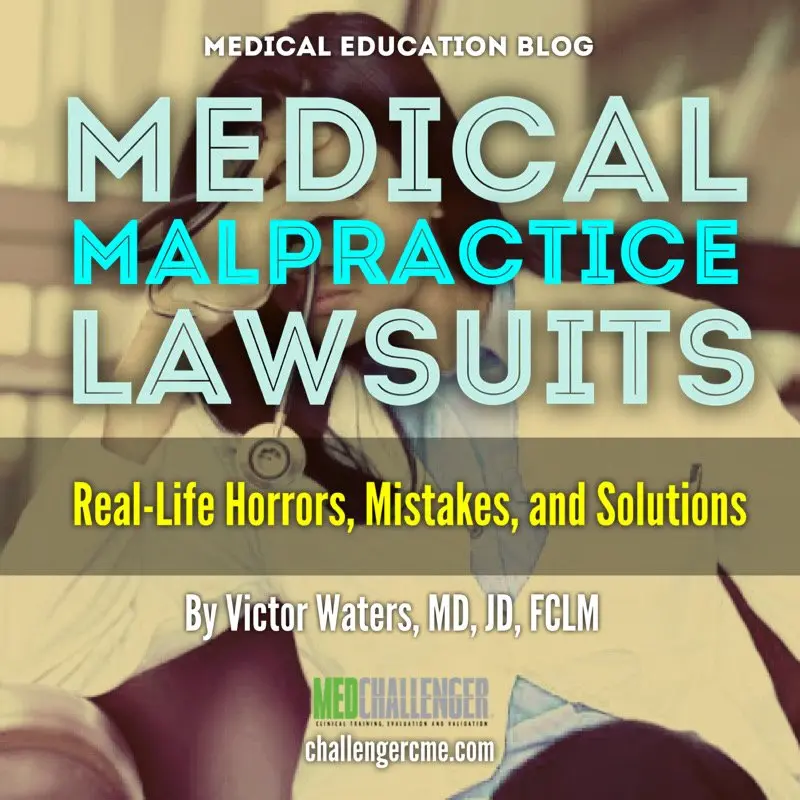A Case for Physician Malpractice Law Education and Expertise
By Victor Waters, MD, JD, FCLM, CMO
I've lost 3 colleagues to suicide. One during medical school, in his final school year. The second, a young promising well-trained ED physician-leader in his forties. The third, a trauma surgeon in this fifties. The last two men, their completed suicides were triggered by liability issues. As a Chief Medical Officer in various locations and sectors, I have personally witnessed the travails that liability has proscribed amongst so many physicians and colleagues.
I remember Dr. M.
Dr. M. was a quiet, modest Pilipino physician that practiced internal medicine for many years. The State had conducted an investigation on Dr. M alleging that he failed to timely diagnose a kidney cancer. The board suspended his license. Dr. M appealed and lost. But this time with heavier penalties and a longer suspension time. (It almost seemed retaliatory).
Dr. M’s legal experience shattered his morale, self-confidence and impacted him financially. (Remember State actions may not be covered or indemnified by the insurance carrier). It cost him over $100,000 to defend himself against the State. To no avail. Fortunately, he was able to continue to practice but with little or no opportunity to advance his career or move to another State or practice. He became an empty “shell” of a physician.
I was appointed my administrative position near the time his suspension was about terminate. I quickly assessed Dr. M’s need and supported for him to get back on the “on-call” schedule (which was taken away as part of the actions by the State). Other docs mocked at the thought of this “loser” to be on call and expressed doubt in his clinical abilities to be able to perform such duties.
Despite the pre-judgments that amassed against Dr. M, I granted him permission. Over several months, Dr. M didn’t disappoint. He became highly regarded and respected as a clinician demonstrated by his clinical aptitude in covering all sorts of complex medical maladies.
Then one day Dr. M called me stating, “I can’t concentrate. I need to go home”.
Dr. M was diagnosed with terminal brain cancer. I made an unannounced visit to Dr. M during his last days at the medical center. He told me that as a “Pilipino man I have great pride in my work as a physician. Thank you for believing in me as a physician, and restoring my privileges to take call”. A few days later he died. His sons and daughters all ivy league trained physicians, and hundreds of admires and family attended his funeral.
You might ask, why share this story? It has nothing to do with malpractice. It doesn’t matter whether it’s a malpractice claim or State Board action – the painful consequences of either are significant.
Years ago, going through a malpractice claim or State Board action, the process was just accepted as a “right of passage" - a process you have to just deal with, much like going to a dentist for a procedure. It was viewed as a necessary evil all in the course of our medical careers.
But today, the impact of liability can penetrate our “souls”, infiltrating us like a virus spreading through our system. The “virus” attacks our brain causing us to lose our self-confidence in how we practice. Then we fear that it will it happen again, and how can I protect myself – triggering Defensive Medicine practices. It can impact our sense of “well-being” – causing depression, anxiety, sleep deprivation, or suffer reputational damage, all which may lead to “burnout”.
Lastly, our “hearts” may be infected – the “good will” to practice, the drive or mission that motivated us to go into medicine. Our infected hearts become “cold”. We lose our ability to empathize, listen, or truly care for patients – as each and every one of them become suspect to filing a claim or report to the State Board warranted or not.
As a result of our detachment and disengagement with patients we fail, with insufficient defenses, to protect ourselves from another malpractice claim. We spiral in a downward trajectory, out of control to a finite point – restriction or loss of our medical licenses, premature retirement (if you can safely afford it), alternative careers (which may not be a bad thing), burnout, or suicide.
